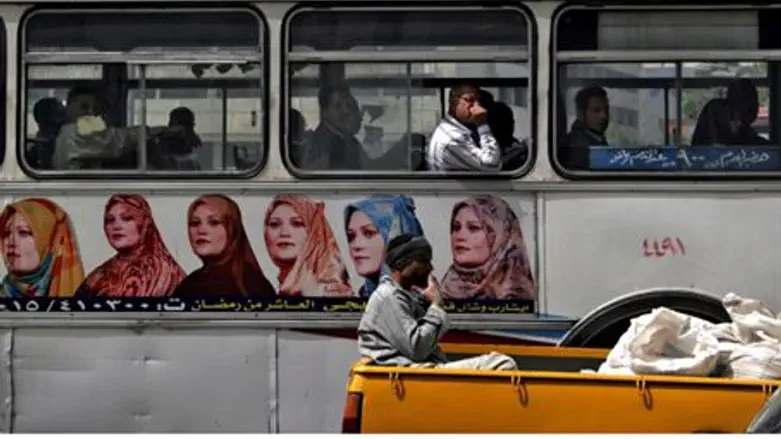
Egyptian women are losing ground in employment and other areas of the economy, recent studies show, and in response are simply returning to more traditional roles.
The jobless rate for Egyptian women in particular is grim, according to the 2010 Report of the Egypt Population Council. The most recent data showed that unemployment for women ages 15 to 29 stood at approximately 32 percent – a figure nearly three times higher that of men in the same age group – 12 percent.
Iman Bibars, chairwoman of the Cairo-based Association for the Development and Enhancement of Women, told The New York Times this week that even though more Egyptian women might be working, the jobs they obtain are not necessarily “liberating.” As a result, she said, “a lot of the younger generation do not want to work.” The comment was followed up by Madiha el-Safty, professor of sociology at the American University in Cairo, who affirmed to the newspaper that “traditions continue to have the upper hand.”
According to the findings of a recent Egyptian Labor Market Survey, 23 percent of city women were illiterate. The number was more than double for women living in villages and outlying rural areas, like the Sinai Bedouin, for example, where it was 47 percent.
Politically Incorrect: Few Egyptian Women at the Top
The inequality is equally lopsided in the political arena, with women as scarce in the judicial system as they are in the parliament.
Only three of the ministers and none of the 29 governors in Egypt are women. Nor are there any female judges in the State Council, Egypt's highest administrative court.
President Hosni Mubarak's ruling National Democratic Party helped push a law through the country's 454-seat parliament this year that set a 64-seat quota for women in the lower house. The new figure will gradually go into effect over the next ten years, starting this fall with the legislative elections. But although the average American might be offended at the idea of any quota, Arab women in the Middle East might consider this progress: at present, only eight women occupy seats in the legislative body.
Quantifying the Inequality: The Pew Report
Moreover, a study released July 1 by the Washington, D.C.-based Pew Research Center, found that 75 percent of Egyptian respondents believe that “When jobs are scarce, men should have more right to a job.” Nine out of ten of all male respondents in Egypt agreed with the statement, compared with 58 percent of Egyptian women.
The survey, conducted by the Pew Research Center's Global Attitudes Project from April 7 to May 8, was carried out in association with the International Herald Tribute.
Half of all respondents in the poll, including 60 percent of Egyptian men, said they believe that a university education is more important for a boy than for a girl. But the women were not as happy with the idea: 60 percent of Egyptian women disagreed with the statement.
Likewise, 76 percent of Egyptian women felt they should have equal rights with men, although less than half of Egyptian men – 45 percent – felt that women should have equal rights. Combined, however, a majority of respondents, 60 percent, agreed with the statement.
The response was almost identical to that evoked by the question of whether women should be able to work outside the home. A majority of 61 percent agreed with that statement – but the response changed when the focus of the question was sharpened, asking whether one “completely agrees that women should be able to work outside the home.” About one-third of Egyptian women (36 percent) and only 11 percent of men agreed with that statement.
Finally, the survey questioned Muslims in the country as to whether they believe “women should have the right to decide if they wear a veil.” Slightly more than half of all respondents – 51 percent, agreed that women should be able to determine if they wear a hair covering of some kind, while slightly less than half, 48 percent, disagreed. By far, women were more supportive of the idea than men: 61 percent of Egyptian women, as opposed to only 41 percent of Egyptian men, said they agree that women should have the right to decide if they wear a veil.
The issue, one that is being debated in numerous countries across Europe, is an especially sensitive one because it touches on a woman's personal and religious right to choose, but also upon the country's political hot potato, rising Muslim fundamentalism. It is precisely over this issue that the French parliament decided in a near-unanimous vote on Tuesday to ban the burka and any other garment that allows a man or woman to completely cover their face in a public area.
Mubarak's largely secular government has for years battled against the rise of the opposition Muslim Brotherhood, a radical Islamic political group outlawed several years ago but still lauded among the grassroots population.